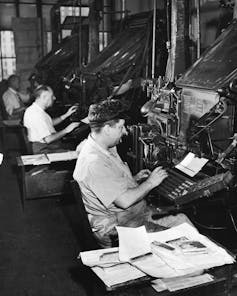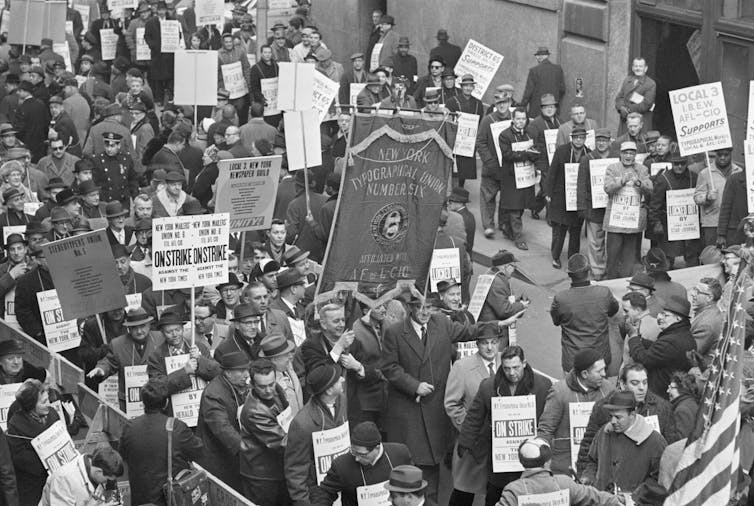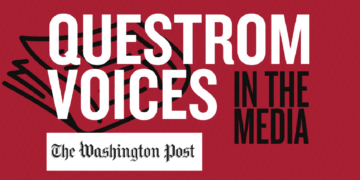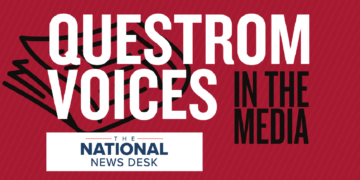Can a seemingly robust labor union simply collapse? The news is full of stories about growing union power – but just because a union is strong now doesn’t mean it’ll stay that way. Important unions have put themselves out of business before. The International Typographical Union, or ITU, is one such example. Once it was among the nation’s most significant unions, but it disappeared in just a few decades.
I am a business school professor who is fascinated by the lessons of the ITU – first, because I teach courses about unions, and second, because I inadvertently participated in the ITU’s demise. But more on that later.
More than just a ‘hot labor summer’
Right now, union leaders are feeling powerful.
More than 360,000 workers have gone on strike in 2023 – nearly three times as many as in all of 2022. The United Auto Workers union is currently striking against Detroit’s Big Three and demanding a 36% pay hike. UPS recently agreed to union demands for a generous new contract, under which the most senior drivers will eventually earn about $170,000 a year. Hollywood was shut down by the screenwriters’ and actors’ strikes.
However, union leaders would be wise not to overplay their hands. The typesetters guild boasted more than 100,000 members at its peak. Today it serves as a cautionary example of how quickly union power can erode.
A brief digression: What is typesetting, anyway?
Our story begins in the 1500s with the invention of the movable-type printing press. Workers called typesetters would take individual blocks of letters and arrange them into lines of text. They would store unused letters in two cases: capital letters in an upper case and smaller letters in the easier-to-access lower case. That practice – which is why English speakers still describe letters as “uppercase” and “lowercase” – would be ripe for disruption a few centuries later.
A typesetter’s biggest concern was letters falling out when put on the printing press. To prevent this, all lines were made justified, or the same width, so text could be locked into a rectangular frame. Being a good typesetter demanded physical skills to move blocks of type quickly. It also took intellect, since typesetters acted as de facto proofreaders and layout designers.
An early American union
Fast-forward a few hundred years. U.S. labor unions started picking up steam after the Civil War, and typographers were quick to unionize, since their high literacy levels helped with organizing. They formed the International Typographical Union in 1852 with more than 1,000 members.
Thirty years after its founding, the ITU faced a major technological shock. In 1886, the inventor Ottmar Mergenthaler was granted a patent for the Linotype machine. This machine allowed operators to select characters by typing them on a keyboard instead of picking them from a type case.
The Linotype’s advantages were quickly evident. A skilled operator could set 6,000 characters per hour, many times faster than a hand compositor. The Linotype also didn’t require blocks of letters to be re-sorted into type cases after material was printed. Instead, lines of type could be melted down and reused.

The Linotype and competing machines didn’t hurt the union because it made publishing cheaper, which resulted in a burst of printing. In fact, ITU membership increased as new newspapers, magazines and book publishers sprang up, all of whom needed skilled workers who could take handwritten copy and transform it into printed text.
By the start of World War I, ITU membership was over 60,000.
The union’s membership peaked in the 1960s, with newspapers being the biggest employers of ITU members. Newspaper publishers didn’t like the ITU because it meant they had to pay for two different expensive workforces: the reporters who created the content and the typesetters who made that content readable. While only some of the reporters were unionized, almost all of the typesetters were.
The decline of the ITU
Starting in the 1960s, other new developments like phototypesetting and then word processing threatened typesetters’ jobs.
The ITU fought against technological changes with a massive strike in New York City. When the strike started, New York City had seven daily newspapers. After a 114-day shutdown, only three remained: The New York Times, the New York Post and the Daily News.

The relatively high pay of typesetters, combined with their ability to shut down production for long periods of time, made newspapers, magazines and other publishers eager customers for high-tech companies that built computers that automatically determined line breaks, hyphenation and text justification. These computers also saved time by eliminating the need for typing copy twice: first by the author and then by a typesetter.
This second technological revolution devastated ITU membership. From 1984 to 1987, its membership halved. In 1986, it merged with the Communications Workers of America, which today doesn’t even mention typographers on its list of sectors.
Walking the negotiating tightrope
Similarly today, unions are pushing for large wage increases at a time when new technologies pose a threat to those workers’ livelihoods. Autonomous vehicles threaten Teamsters truckers; robots and simpler-to-build electric vehicles threaten United Auto Workers; ChatGPT threatens screenwriters.
Labor leaders walk a fine line: Their job is to advocate for workers, but making aggressive demands can backfire if they prompt employers to more quickly embrace automation. In other words, there’s a risk that militancy today can destroy union jobs tomorrow.
Oh, yes – how did I inadvertently help the ITU’s demise?
After newspapers computerized their news operations, typographers were still needed to create display ads. I joined a small high-tech company that built some of the first software and hardware that automated creating display ads. Our systems cost millions of dollars but were eagerly purchased by large newspapers.
The irony was that shortly after my company helped put the final nail in the ITU’s coffin, a new wave of computer companies such as Apple, Adobe and Hewlett-Packard created the desktop publishing revolution. That technological change put the company I worked for out of business.




















